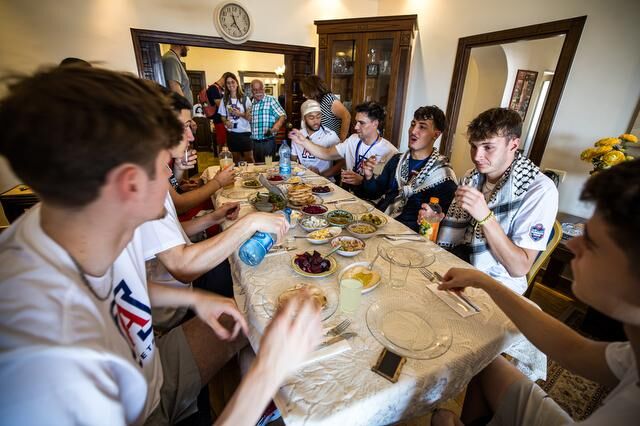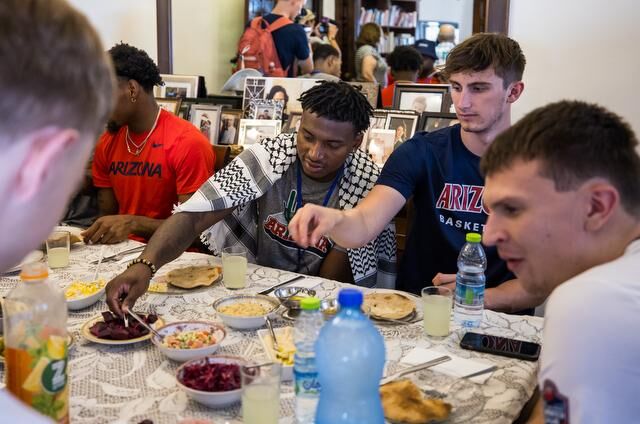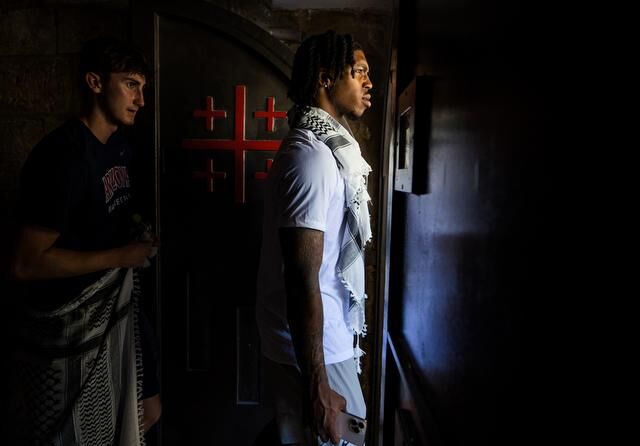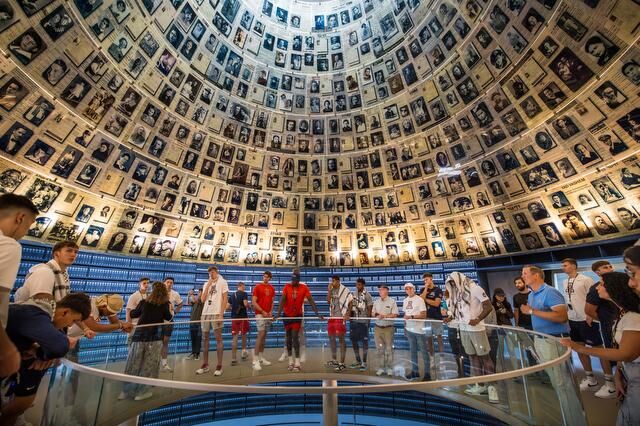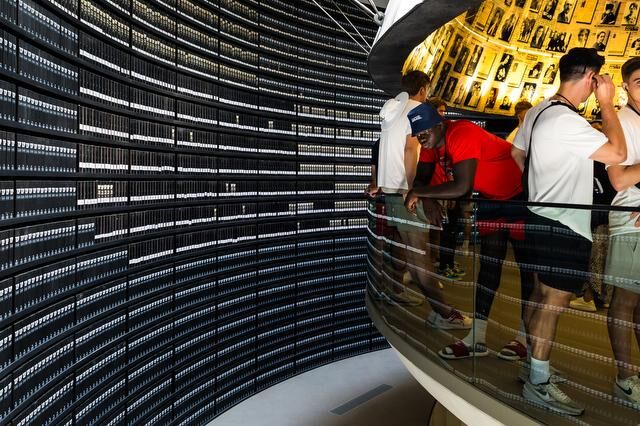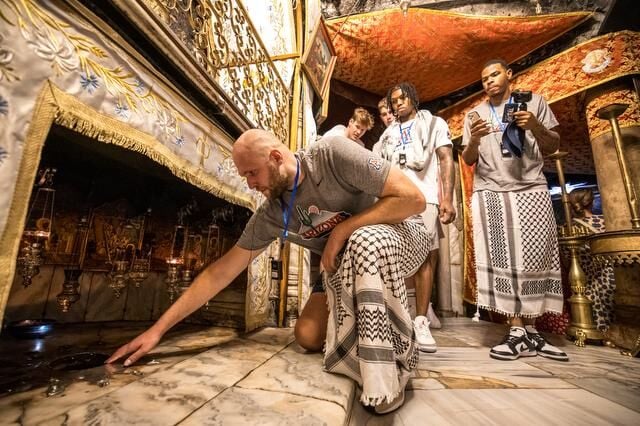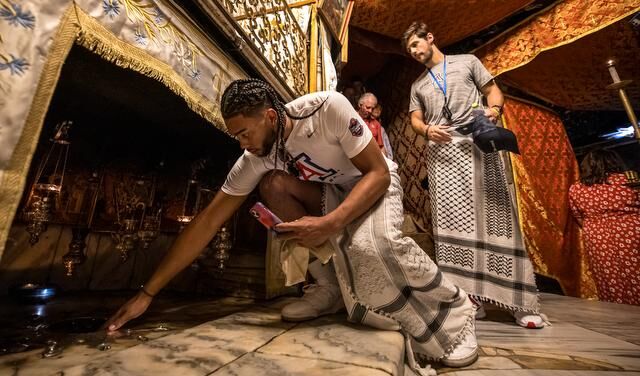BETHLEHEM, West Bank – Just before 7-footer Oumar Ballo ducked at nearly 90 degrees to head under the Church of the Nativity, on the site where Jesus was said to be born, the Arizona Wildcats’ tour guide peppered them with a question.
“What is the symbol of Jesus’ birth?” asked Kamal Murkarker.
“The cross?” a few said.

Arizona sophomore guard Kylan Boswell visits the Church of the Nativity in Bethlehem, West Bank. Pictured, Boswell and the UA men’s basketball team and traveling party visit the spot, marked by a 14-point star in the floor in the Grotto of the Nativity, believed to be where Jesus was born.
“The manger,” Tommy Lloyd said.
Murkarker smiled.
“Coach is right,” he said. “As always.”
Then the Wildcats descended below the main church, encountering a group of singers as they approached a small cave, which was marked with a 14-point metal star, in the spot where Murkarker said the manger once was.

Przemek Karnowski a graduate assistant coach for the Arizona men’s basketball team, visits the Church of the Nativity in Bethlehem, West Bank. Pictured, Karnowski and the UA traveling party visit the spot, marked by a 14-point star in the floor in the Grotto of the Nativity, believed to be where Jesus was born.
All members of UA’s traveling party were told to take their passports and Israel tourist visa cards in case they were demanded, though the guards backed off after varying degrees of questioning and never asked for them, despite their intimidating appearance.
Tension and optimism clashed more subtly once the Wildcats ventured inside the West Bank. In Bethlehem, on the short walk uphill past empty gift shops to the church, a member of the team’s traveling party was informed, bluntly, that they were not in Israel anymore, despite just a six-mile distance.

Arizona men’s basketball player Jaden Bradley and team manager Luc Rosenblatt join their teammates and traveling party in a homemade meal after a tour in Bethlehem, West Bank, Friday as part of the UA program’s summer 2023 Mideast tour.
After the church visit, Murkarker led the Wildcats to his home in nearby Beit Jala, where he said said 80% of the residents were actually Christians, including his family.
“We do exist, as Palestinians and Christians,” Murkarker said.
Then, toward the end of a lavish lunch at the family’s home, Murkarker introduced his father, Nicolas, who had cooked much of the feast, which included meatballs, chicken, rice, eggplant, beets, hummus and about 10 other dishes.
Applauded for his efforts, Nicolas smiled and used his platform to address the tension in the area.

Dylan Anderson, Will Menaugh, Filip Borovicanin, Henri Veesaar, Conrad Martinez, Luke Champion, Grant Weitman, graduate assistant Austin Torres and Kylan Boswell join their Arizona men’s basketball teammates and traveling party in a homemade meal after a tour in Bethlehem, West Bank, Friday as part of the UA program’s summer 2023 Mideast tour.
“We wish to have peace,” he said. “Just like you.”
After lunch, the Wildcats this time stopped for inspection by the Israeli border guards. One walked curiously into one of their buses with a machine gun, but was told this was a basketball team from Arizona that was touring the area.
“Arizona?” he said, looking around briefly, then stepping quietly off the bus. No passports were needed, and the Wildcats headed to an Israeli freeway toward their next stop.
There, a different sort of tension greeted them as they pulled up to Yad Vashem, Jerusalem’s Holocaust memorial.

The Arizona men’s basketball team and traveling party visit Yad Vashem — The World Holocaust Remembrance Center, in Jerusalem Friday as part of the Wildcats’ 2023 Mideast summer tour.
“It’s a disturbing place,” was the opening warning from Alan Brussel, a Jerusalem-based tour guide originally from Boston who narrated for part of the UA traveling party.
Brussel walked the group through countless exhibits of the planning, strategies and executions of the concentration camps. While he noted the Nazi goal to eliminate the Jewish population, once pointing to a movie where Jewish prisoners jumped unknowingly into a ditch and were shot to death, he always returned to one question.
“Why did they die? Think about that for a minute,” Brussel said. “There is no reason.”

The Arizona men’s basketball team and traveling party, including redshirt junior Oumar Ballo (red shirt), visit Yad Vashem — The World Holocaust Remembrance Center, in Jerusalem Friday as part of the Wildcats’ 2023 Mideast summer tour.
Brussel ended his tour on a more upbeat note, singling out one Nazi official who was executed for his efforts to help save Jews, and noting how Ben Gurion founded Israel in post-war 1948 despite warnings that Jews could face more targeting.
Then, after a brief late afternoon break, the Wildcats’ day turned into a party.
“Shabbat Shalom!” said Daniel Posner, founder of the Athletes for Israel organization that created the trip for Arizona and Kansas State.
Noting the words for “peaceful rest,” Posner gave the Wildcats a primer on Shabbat, where businesses close from Friday at sunset until Saturday after dark in order to allow focus on themselves, family and food.
Of course, then, the day ended with food. Lots of it. The Wildcats were treated to a gigantic Shabbat buffet dinner at the team’s upscale hotel, with seemingly every meat, fish, vegetable, bread and fruit represented. There were even goose wings.
It was the dessert for a day they will likely never forget.
“Great experience,” UA freshman Motiejus Krivas said Friday afternoon. “Once in a lifetime.”

Arizona men’s basketball player Caleb Love and his teammates visit the Church of the Nativity in Bethlehem, West Bank, Friday as part of the as part of the Wildcats’ 2023 Mideast summer tour.


